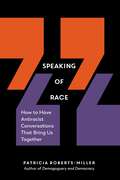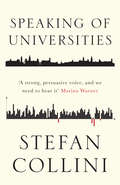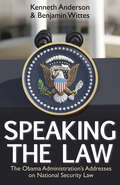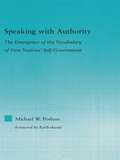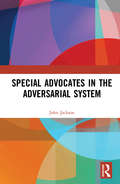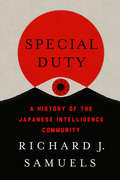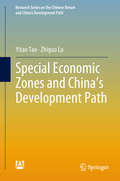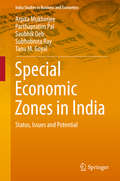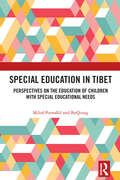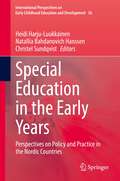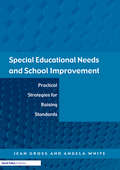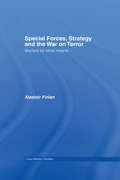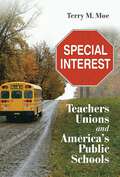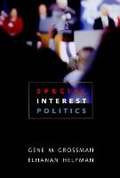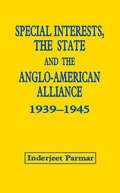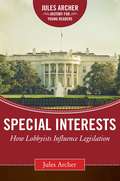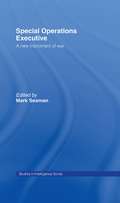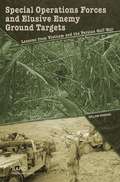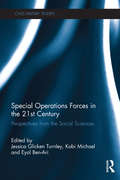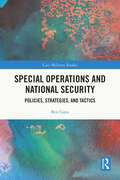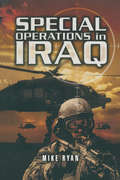- Table View
- List View
Speaking of Race: How To Have Antiracist Conversations That Bring Us Together
by Patricia Roberts-Miller“Readers of all levels and backgrounds will appreciate the clarity with which Roberts-Miller approaches a topic so often driven by powerful emotion.”—Choice It’s easy to say that racism is wrong. But it’s surprisingly hard to agree on what it is. Does a tired stereotype in your favorite movie make it racist? Does watching it anyway mean you’re racist? Even among like-minded friends, such discussions can quickly escalate to hurt feelings all around—and when they do, we lose valuable opportunities to fight racism. Patricia Roberts-Miller is a scholar of rhetoric—the art of understanding misunderstandings. In Speaking of Race, she explains why the subject is a “third rail” and how we can do better: We can acknowledge that, in a racist society, racism is not the sole provenance of “bad people.” We can focus on the harm it causes rather than the intent of offenders. And, when someone illuminates our own racist blind spots, we can take it not as a criticism, but as a kindness—and an opportunity to learn and to become less racist ourselves.
Speaking of Spain: The Evolution of Race and Nation in the Hispanic World
by Antonio FerosMomentous changes swept Spain in the fifteenth century: royal marriage united its two largest kingdoms, the last Muslim emirate fell to Catholic armies, and conquests in the Americas were turning Spain into a great empire. Yet few people could define “Spanishness” concretely. Antonio Feros traces Spain’s evolving ideas of nationhood and ethnicity.
Speaking of Universities
by Stefan ColliniA devastating analysis of what is happening to our universitiesDoes “marketization” threaten to destroy what we most value about education? Will this new era of “accountability” distort what it purports to measure? What do we mean by a “public” system of higher education and how should we defend it? Globalization has transformed the economic horizon. At the same time governments have systematically imposed new regulations for funding, governance, and assessment. Increasingly, universities behave more like business enterprises in a commercial marketplace than centers of learning. In recent decades there has been an immense global surge in the number of universities and the size of the student population. Technology has created new ways of learning and teaching.In Speaking of Universities, historian and critic Stefan Collini analyses these changes and challenges the assumptions of policymakers and commentators. This is an urgent call to “focus on what is actually happening and the clichés behind which it hides; an incitement to think again, think more clearly, and then to press for something better.”
Speaking the Law: The Obama Administration's Addresses on National Security Law
by Benjamin Wittes Kenneth AndersonWhen Barack Obama came into office, the strategic landscape facing the United States in its overseas counterterrorism operations was undergoing a shift. Even before the rise of drones necessitated the articulation of legal doctrine, the Obama administration had to explain itself. In Speaking the Law, the authors offer a detailed examination of the speeches of the Obama administration on national security legal issues. Viewed together here for the first time, the authors lay out a broad array of legal and policy positions regarding a large number of principles currently contested at both the domestic and international levels. The book describes what the Obama administration has said about the legal framework in which it is operating with respect to such questions as the nature of the war on terrorism, the use of drones and targeted killings, detention, trial by military commission and in federal courts, and interrogation. The authors analyze this framework, examining the stresses on it and asking where the administration got matters right and where they were wrong. They conclude with suggestions for certain reforms to the framework for the administration and Congress to consider.
Speaking with Authority: The Emergence of the Vocabulary of First Nations' Self-Government (Indigenous Peoples and Politics)
by Michael W. PoslunsThis work explores the emergence of the vocabulary of First Nations' self-government into the realm of public and parliamentary discourse in Canada during the decade of the 1970s. The emergence of the vocabulary is chronicled through a study of the testimony of First Nations and aboriginal witnesses before a series of Joint Committees on the Constitutions and the Commons Committee on Indian Affairs and Northern Development.
Spearheads for Reform: The Social Settlements and the Progressive Movement, 1890 to 1914
by Allen F. DavisBeginning in the late 1880s, the social settlement movement brought educated young women and men of the privileged classes into some of the poorest communities of America's cities. Living as "neighbors" to the struggling immigrant families, they attempted to bring about a series of social reforms that they believed would build a better world. This book focuses on the period from the rise of the settlement movement until World War I. It examines the role of the settlements in education, housing, the labor movement, politics, and much more.
Special Advocates in the Adversarial System
by John JacksonThe last twenty years have seen an unprecedented rise in the use of secret courts or ‘closed material proceedings’ largely brought about in response to the need to protect intelligence sources in the fight against terrorism. This has called into question the commitment of legal systems to long-cherished principles of adversarial justice and due process. Foremost among the measures designed to minimise the prejudice caused to parties who have been excluded from such proceedings has been the use of ‘special advocates’ who are given access to sensitive national security material and can make representations to the court on behalf of excluded parties. Special advocates are now deployed across a range of administrative, civil and criminal proceedings in many common law jurisdictions including the UK, Canada, New Zealand, Hong Kong and Australia. This book analyses the professional services special advocates offer across a range of different types of closed proceedings. Drawing on extensive interviews with special advocates and with lawyers and judges who have worked with them, the book examines the manner in which special advocates are appointed and supported, how their position differs from that of ordinary counsel within the adversarial system, and the challenges they face in the work that they do. Comparisons are made between different special advocate systems and with other models of security-cleared counsel, including that used in the United States, to consider what changes might be made to strengthen their adversarial role in closed proceedings. In making an assessment of the future of special advocacy, the book argues that there is a need to reconceptualise the unique role that special advocates play in the administration of justice.
Special Duty: A History of the Japanese Intelligence Community
by Richard J. SamuelsThe prewar history of the Japanese intelligence community demonstrates how having power over much, but insight into little can have devastating consequences. Its postwar history—one of limited Japanese power despite growing insight—has also been problematic for national security.In Special Duty Richard J. Samuels dissects the fascinating history of the intelligence community in Japan. Looking at the impact of shifts in the strategic environment, technological change, and past failures, he probes the reasons why Japan has endured such a roller-coaster ride when it comes to intelligence gathering and analysis, and concludes that the ups and downs of the past century—combined with growing uncertainties in the regional security environment—have convinced Japanese leaders of the critical importance of striking balance between power and insight. Using examples of excessive hubris and debilitating bureaucratic competition before the Asia-Pacific War, the unavoidable dependence on US assets and popular sensitivity to security issues after World War II, and the tardy adoption of image-processing and cyber technologies, Samuels' bold book highlights the century-long history of Japan's struggles to develop a fully functioning and effective intelligence capability, and makes clear that Japanese leaders have begun to reinvent their nation's intelligence community.
Special Economic Zones and China’s Development Path (Research Series on the Chinese Dream and China’s Development Path)
by Yitao Tao Zhiguo LuThe book provides insights into the development of special economic zones, which are an important factor in the political and economic reforms in China. It discusses a number of topics, including the history and the modernization of special economic zones in China, the contributions of special economic zones to China’s economic success and cultural change, as well as the new mission of special economic zones in the current economic-social context. Applying institutional economics and growth poles theory, it discusses the mechanism of China’s path driven by special economic zone practices. The book is a valuable resource for researchers interested in special economic zones, political and institutional reforms and economic transformation during China’s modernization.
Special Economic Zones in India
by Arpita Mukherjee Parthapratim Pal Saubhik Deb Subhobrota Ray Tanu M GoyalThis book examines India's ten years of experience developing Special Economic Zones (SEZs) and the performance of SEZs in the context of India's growing international engagement, its endeavours to attract domestic and foreign investment in manufacturing and services and its aim to increase and diversify exports of goods and services. SEZs are industrial enclaves/clusters within a country that receive certain incentives and business facilitation benefits that are not generally available to the rest of the country. To facilitate private and foreign investment in SEZs, India introduced the SEZ policy in 2000, which was followed by the SEZ Act in 2005. After ten years under the Act, India now has one of the largest number of approved SEZs in the world and its SEZ policy remains heatedly debated, with a number of studies arguing both for and against it. Given this background, the book also identifies the challenges faced by SEZs in India and offers policy recommendations on how to make the SEZs an engine for India's economic growth and development that can more effectively link the country's manufacturing and services sectors to global value chains.
Special Education in Tibet: Perspectives on the Education of Children with Special Educational Needs
by Miloň Potměšil Bu QiongThis book analyses the value orientation system of education in Tibet and examines the special education interventions aimed at children with disabilities in the region. The authors draw on their interviews with students, parents, and teachers to shed light on how education is viewed by the general population in Tibet. The book looks at themes such as traditional Tibetan education, the ways in which value orientation affects the development of disabled children, the role of special education interventions in building self-esteem and confidence, and the importance of developing pedagogical care and special schools in Tibet. It also reviews China’s existing legal provisions and policies dedicated to persons with disabilities in comparison with Tibet. Finally, it emphasizes the role of practicing social acceptance for children with special educational needs and recommends developing special education interventions based on the cultural foundation and real social conditions of the ethnic group. Based on in-depth qualitative and quantitative research, this book will be of interest to teachers, students, and researchers of education, special education, curriculum studies, sociology, anthropology, disability studies, minority studies and cultural studies. It will also be useful for educationalists, special education institutions, policymakers, social activists, and NGOs.
Special Education in the Early Years: Perspectives on Policy and Practice in the Nordic Countries (International Perspectives on Early Childhood Education and Development #36)
by Heidi Harju-Luukkainen Natallia Bahdanovich Hanssen Christel SundqvistThis book explores policies and practices in special education in the early years, highlighting shared enablers and barriers. It examines research, policies and practices from different Nordic countries and discusses the theory and empirical data underlying the research. It looks at specific issues including gifted children, social inequality and exclusion, teaching children with autism, inclusive practice, language and emotions. The book offers critical perspectives, highlights potential developmental objects and gives recommendations for further research as well as policy and practice. The book features many aspects of the so-called Nordic model - the economic and social policies common to the Nordic Countries: Denmark, Finland, Norway and Sweden. The findings provide important insights into the Nordic model and advance the understanding of relevant issues facing the Nordic countries.
Special Educational Needs and School Improvement: Practical Strategies for Raising Standards
by Jean Gross Angela WhiteProviding a practical guide to strategic management in the field of special educational needs, this text gives the reader a framework for raising achievement throughout the school.
Special Forces, Strategy and the War on Terror: Warfare By Other Means (Cass Military Studies #Vol. 28)
by Alastair FinlanThis volume undertakes a systematic analysis of the relationship between Special Forces and contemporary strategy, explaining the resurgence of interest in Special Forces, particularly in the West, by exploring their appeal over traditional conventional force options in the current ‘War on Terror’. Special Forces, Terrorism and Strategy comprises four overarching themes: theory and practice command and control culture and technology operations and the ‘War on Terror’. By developing a credible theory about the role of Special Forces in contemporary strategy, Alastair Finlan assesses the changing character of the relationship between conventional forces and Special Forces, illustrating the prominent role of these forces in the ‘War on Terror’. This book will be of great interest to students of strategic studies and military history, as well as for professional military colleges.
Special Interest
by Terry M. MoeWhy are America's public schools falling so short of the mark in educating the nation's children? Why are they organized in ineffective ways that fly in the face of common sense, to the point that it is virtually impossible to get even the worst teachers out of the classroom? And why, after more than a quarter century of costly education reform, have the schools proven so resistant to change and so difficult to improve?In this path-breaking book, Terry M. Moe demonstrates that the answers to these questions have a great deal to do with teachers unions-which are by far the most powerful forces in American education and use their power to promote their own special interests at the expense of what is best for kids.Despite their importance, the teachers unions have barely been studied. Special Interest fills that gap with an extraordinary analysis that is at once brilliant and kaleidoscopic-shedding new light on their historical rise to power, the organizational foundations of that power, the ways it is exercised in collective bargaining and politics, and its vast consequences for American education. The bottom line is simple but devastating: as long as the teachers unions remain powerful, the nation's schools will never be organized to provide kids with the most effective education possible.Moe sees light at the end of the tunnel, however, due to two major transformations. One is political, the other technological, and the combination is destined to weaken the unions considerably in the coming years-loosening their special-interest grip and opening up a new era in which America's schools can finally be organized in the best interests of children.
Special Interest Politics
by Gene M. Grossman Elhanan HelpmanWinner of 2002 William H. Riker Award for Best Book in Political Economy, presented by the American Political Science Association (APSA). This landmark theoretical book is about the mechanisms by which special interest groups affect policy in modern democracies. Defining a special interest group as any organization that takes action on behalf of an identifiable group of voters, Gene Grossman and Elhanan Helpman ask: How do special interest groups derive their power and influence? What determines the extent to which they are able to affect policy outcomes? What happens when groups with differing objectives compete for influence? The authors develop important theoretical tools for studying the interactions among voters, interest groups, and politicians. They assume that individuals, groups, and parties act in their own self-interest and that political outcomes can be identified with the game-theoretic concept of an equilibrium. Throughout, they progress from the simple to the more complex. When analyzing campaign giving, for example, they begin with a model of a single interest group and a single, incumbent policy maker. They proceed to add additional interest groups, a legislature with several independent politicians, and electoral competition between rival political parties. The book is organized in three parts. Part I focuses on voting and elections. Part II examines the use of information as a tool for political influence. Part III deals with campaign contributions, which interest groups may use either to influence policy makers' positions and actions or to help preferred candidates to win election.
Special Interest: Teachers Unions and America's Public Schools
by Terry M. MoeWhy are America's public schools falling so short of the mark in educating the nation's children? Why are they organized in ineffective ways that fly in the face of common sense, to the point that it is virtually impossible to get even the worst teachers out of the classroom? And why, after more than a quarter century of costly education reform, have the schools proven so resistant to change and so difficult to improve?In this path-breaking book, Terry M. Moe demonstrates that the answers to these questions have a great deal to do with teachers unions--which are by far the most powerful forces in American education and use their power to promote their own special interests at the expense of what is best for kids.Despite their importance, the teachers unions have barely been studied. Special Interest fills that gap with an extraordinary analysis that is at once brilliant and kaleidoscopic--shedding new light on their historical rise to power, the organizational foundations of that power, the ways it is exercised in collective bargaining and politics, and its vast consequences for American education. The bottom line is simple but devastating: as long as the teachers unions remain powerful, the nation's schools will never be organized to provide kids with the most effective education possible.Moe sees light at the end of the tunnel, however, due to two major transformations. One is political, the other technological, and the combination is destined to weaken the unions considerably in the coming years--loosening their special-interest grip and opening up a new era in which America's schools can finally be organized in the best interests of children.
Special Interests, the State and the Anglo-American Alliance, 1939-1945 (Routledge Library Editions: Ww2 Ser. #32)
by Inderjeet ParmarThis book aims to enhance our understanding of the Anglo-American alliance by examining the origins of the alliance during the Second World War. It presents a case study of how power is distributed in British society, and who makes the political decisions that decisively shape the society and world in which we live.
Special Interests: How Lobbyists Influence Legislation (Single Titles Ser.)
by Jules ArcherIn order to advance their various causes and concerns, these groups hire individuals or firms called lobbyists to work on their behalf to influence the decisions of state and federal lawmakers. Lobbies have been a part of American history ever since Benjamin Franklin appealed to Britain’s Parliament to remove a tax on stamps in 1757. The right of any person or group to “petition the government for a redress of grievances” was and is protected by the first amendment, remembering the British government’s refusal to listen to the grievances of the American colonists, which brought on the American Revolution. Today, however, many lobbying activities have exceeded the boundaries of Thomas Jefferson’s original good intention and often involve the inappropriate use of money and influence to gain advantages that are not always in the public interest. Although lobbyists have the right to appeal to and advise our legislators, only our elected officials have the right to actually write our laws. Jules Archer has written a broad-reaching description of the lobbying system in America. He describes who lobbyists are and discusses perks, PACS, and pork, and the various other means that lobbyists use to influence legislators, the public, and even the White House.
Special Needs and Services: Philosophy, Programs, and Practices for the Creation of Quality Service for Children
by James A Rivaldo Ph.D. Stevanne Auerbach Jeannette WatsonSpecial Needs and Services examines and supports parent participation, training programs, role of play in the physical, mental and social development of children, and community involvement as the basis for effective childcare programs. Includes perspectives from different cultures and needs when considering the delivery of services. This valuable volume provides views on historical, political issues; social, economic needs; and essential insights and trends reported from direct professional and personal experiences in diverse locations and provides guidance for future directions. Foreword by Jeanette Watson, former Director, Early Childhood Development Division, Texas Department of Community Affairs. Contributors include Docia Zavitkovsky, Ida M Bucher, Francione Lewis, Lucille Gold, Carol Hardrove, Dollie Wolverton, Elsa Ten Broeck, Lottie Rosen, James A. Johnson, Jr., Oscar Uribe, Mila Pascual, Roderick Auyang, Daniel Safran, Patricia Siegel, Dr. Joan M. Bergstrom, Gwen Morgan and Dr. Stevanne Auerbach.
Special Operations Executive: A New Instrument of War (Studies in Intelligence)
by Mark SeamanThis unique book presents an accurate and reliable assessment of the Special Operations Executive (SOE). It brings together leading authors to examine the organization from a range of key angles. This study shows how historians have built on the first international conference on the SOE at the Imperial War Museum in 1998. The release of many records then allowed historians to develop the first authoritative analyses of the organization’s activities and several of its agents and staff officers were able to participate. Since this groundbreaking conference, fresh research has continued and its original papers are here amended to take account of the full range of SOE documents that have been released to the National Archives. The fascinating stories they tell range from overviews of work in a single country to particular operations and the impact of key personalities. SOE was a remarkably innovative organization. It played a significant part in the Allied victory while its theories of clandestine warfare and specialised equipment had a major impact upon the post-war world. SOE proved that war need not be fought by conventional methods and by soldiers in uniform. The organization laid much of the groundwork for the development of irregular warfare that characterized the second half of the twentieth century and that is still here, more potent than ever, at the beginning of the twenty-first. This book will be of great interest to students of World War II history, intelligence studies and special operations, as well as general readers with an interest in SOE and World War II.
Special Operations Forces and Elusive Enemy Ground Targets
by William RosenauIn the Vietnam War and the Persian Gulf conflict, special operations forces (SOF) conducted reconnaissance operations to locate hidden targets when political and other considerations prevented the deployment of conventional ground units and air power alone was unable to locate and eliminate elusive objectives. In Vietnam, SOF teams crossed the border into Laos to search for truck parks, storage depots, and other assets along the Ho Chi Minh Trail that were obscured by jungle canopy and camouflage. In western Iraq, British and American SOF patrolled vast areas searching for mobile Scud launchers. In both cases, the nature of the terrain combined with adversary countermeasures made it extremely difficult for ground teams to achieve their objectives. There are a number of implications for future operations. Although new technology, such as mini- and micro-unmanned aerial vehicles, may make it easier to teams to reconnoiter wide areas, using SOF in this fashion is unlikely to achieve U.S. objectives. Concerns about casualties and prisoners of war are likely to limit the use of SOF to the most vital national interests. However, unattended ground sensors could play an enhanced role in future operations. Although most will be delivered by air, some will require hand emplacement in difficult enemy terrain, a mission well suited to SOF. SOF in a battle damage assessment role could help ensure that critical targets have been destroyed. Finally, SOF might disable, destroy, or recover nuclear, biological, or chemical weapons.
Special Operations Forces in the 21st Century: Perspectives from the Social Sciences (Cass Military Studies)
by Eyal Ben-Ari Jessica Glicken Turnley Kobi MichaelThis book sets out the major social scientific approaches to the study of Special Operations Forces. Despite consistent downsizing, over the past two decades the armed forces of the industrial democracies have seen a huge growth in Special Operations Forces (SOF). Through increasing numbers of personnel and more frequent deployments, SOF units have wielded considerable influence in conflicts around the world, with senior SOF officers having led major strategic operations. This increased presence and unprecedented expansion for SOF is largely a result of the ‘new’ kinds of conflicts that have emerged in the 21st century. At the same time, even with this high profile in the military, policy and media and popular cultural arenas, there is relatively little social scientific research on SOF. This volume aims to fill this gap by providing a series of studies and analyses of SOF across the globe, since the end of World War II. Analysing SOF at the micro, mezzo and macro levels provides broad and diverse insights. Moreover, the volume deals with new issues raised by the use of such forces that include emerging modes of civilian control, innovative organizational forms and the special psychological characteristics necessitated by SOF operatives. It concludes with a discussion of a question which continues to be debated in today’s militaries: what makes SOF ‘special’? Filling a clear gap in the literature, this book will be of much interest to students of strategic studies, civil-military relations, irregular warfare, security studies, and international relations.
Special Operations and National Security: Policies, Strategies, and Tactics (Cass Military Studies)
by Ben GansThis book focuses on strategic special operations and how these have led to the achievement of major foreign policy goals, which is illustrated by six case studies.The study specifically focuses on the alignment of the policies, strategies, and tactics that dominated these operations, providing a fresh perspective. Theoretically, the work underscores the continued relevance of relative superiority as the dominant theory in the field. Importantly, it aligns the potential ways of achieving and sustaining relative superiority with the ability to conduct contemporary special operations across multiple domains, thereby generating cross-dimensional effects. In terms of methodology, the book includes a description and analysis of six distinct case studies in special operations, ranging from short-term surgical strikes to sustained special warfare campaigns and spanning multiple geographic regions – including in Iran, Lebanon, Syria, Ukraine, and the South China Sea. From that perspective, relative superiority theory is extrapolated to explain how this critical condition can be achieved and sustained during protracted special operations. The unique value of this research is underscored by the author's collection of exclusive primary source data on the operations in the respective countries. The book’s conclusions explain how the personnel involved fulfill the strategic promise of special operations, given their position within the larger framework of foreign policy.This book will be of much interest to students of special operations, military and strategic studies, defense studies, and security studies in general.
Special Operations in Iraq
by Mike RyanThis sensational book reveals the true and compelling story of the Special Force units of the Coalition, such as the SAS, SBS and Delta Force who worked in the shadows, often unseen, unheard and unsung. It describes their missions behind the lines from the early days, well before hostilities opened formally. It was an open secret that groups were deployed probably operating in the western desert against Saddam's forces and the Scud missile threat. What was actually going on is revealed here and until now their roles and actions have not been described in any detail. These are thrilling tales of incredible daring and endurance told by men whose courage and military skills are inspiring. The book also covers operations such as the spectacular rescue of POW Private Lynch and the secret operations to target Saddam and other leaders of his regime of terror.
